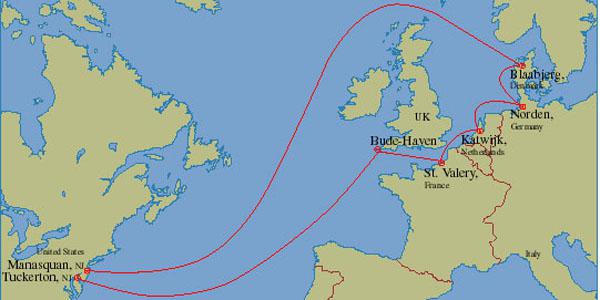Russia Could Cut Undersea Communications Cables
Undersea fiber optic communications cables are minimally protected and have locations that are public knowledge. This puts these vital communication links at risk of nation-state and terrorist attacks that could cause immense harm.
Furthermore, there is no alternative to these cables, warned Rishi Sunak, a Conservative member of Britain's Parliament. Nearly all global communications are transmitted via undersea cables, he said. "We must do more to protect the indispensable yet insecure Internet infrastructure provided by undersea cables," Sunak said. "Ninety-seven percent of global communications and $10 trillion in daily financial transactions are transmitted not by satellites in the skies but by cables lying deep beneath the ocean."
Sunak sounded the alarm in his recent report, "Undersea Cables: Indispensable, Insecure," published by the Policy Exchange, a U.K. think tank.
Although undersea cables such as the transatlantic cable network connecting the United States to the U.K., France, the Netherlands, Germany and Denmark are considered indispensable, they are not adequately protected, the report suggested. This is especially true as many of the cables are privately owned assets. The cables are "highly vulnerable to attack at sea and on land, from both hostile states and terrorists," according to the report. Sunak cautioned that the cables are in jeopardy of a possible Russian attack. He recounted that when Russia annexed Crimea in 2014, it quickly severed Crimea's main communications cable linking it to the outside world.
As such, governments need to do more to protect the communication lines, he said.
For the U.K., this means that the government should address the threat of attacks, quickly review and improve security at U.K. sites where cables come ashore, and ensure that the British military and NATO have adequate maritime resources to deal with this new threat. The government should work with private communications companies to install more backup "dark cables" and improve monitoring at sea, Sunak advised. "We should follow the example of Australia and New Zealand and establish cable protection zones around our highest-value communications corridors," he said.
In addition, the U.K. must lead efforts to develop a new international treaty to protect undersea cables because international law—including the United Nations Convention on the Law of the Sea (UNCLOS)—is "highly deficient" in addressing undersea cables, the report said. UNCLOS measures do not give states adequate jurisdiction over offenders or allow the ability to board suspect vessels. The measures, which are not consistently enacted by all countries, also do not address protection of cables on land. "The current international law is more suited to the peripheral role cables played in the ’70s and ’80s rather than to the indispensable status they hold today," Sunak advised.
Adm. James Stavridis, USN (Ret.), former NATO supreme allied commander Europe, who prepared the forward for the report, remarked that "it is not satellites in the sky but pipes on the ocean floor that form the backbone or the world’s economy. We have allowed this vital infrastructure to grow increasingly vulnerable, and this should worry us all."
The admiral, according to the report, has seen the Atlantic Ocean corridor move from "near-complete NATO supremacy to a space that Russia is actively contesting. If the relative weakness of the Russian position makes a conventional conflict with NATO unlikely, it also raises the appeal for them of asymmetric targets like fiber optic cables." He added that threats to undersea cables also might come from China and Iran.
"As we debate our future defense priorities, protecting the freedom of the seas and all the lanes of communication on and under them is paramount," Sunak opined. "Britain and our NATO allies must ensure that our maritime capabilities get the investment they need. Working with these global partners, it is crucial that we act now to protect against these dangers, ensuring that our century's greatest innovation does not also become its undoing."





Comments